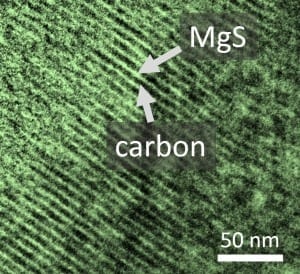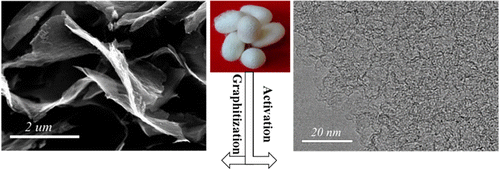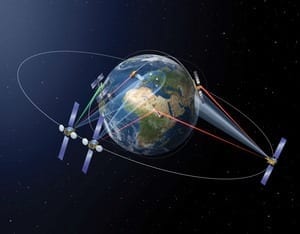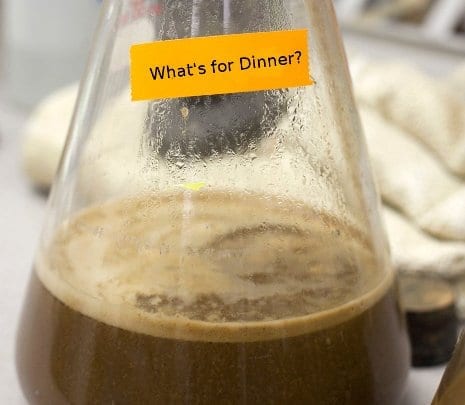
Electrolyte of Excellent Electrochemical Stability and High Efficiency –Promising Potential for the Development of New Types of Batteries
The Helmholtz Institute Ulm (HIU) established by Karlsruhe Institute of Technology (KIT) is pushing research relating to batteries of the next and next-but-one generations: A research team has now developed an electrolyte that may be used for the construction of magnesium-sulfur battery cells. With magnesium, higher storage densities could be achieved than with lithium. Moreover, magnesium is abundant in nature, it is non-toxic, and does not degrade in air. The new electrolyte is now presented in the journal “Advanced Energy Materials”.
In many electrical devices, lithium-ion and metal-hydride batteries are applied for energy storage. Scientists are also studying alternatives to these established battery systems in order to enhance the safety, cost efficiency, sustainability, and performance of future devices. It is their objective to replace lithium by other elements. For this purpose, all battery components have to be newly developed and understanding of electrochemical processes is required.
Magnesium-based battery cells are presently considered an attractive option to replace lithium in batteries. In principle, magnesium allows higher storage densities to be reached than lithium. Other advantages of magnesium are its high abundance in nature, its non-toxicity, and its low degradation in air in contrast to lithium. So far, progress achieved in this area has been limited. For the design of magnesium batteries of high storage capacity and power density, suitable electrolytes are needed that can be easily to produced, that are stable, and can be used in high concentrations in different solvents.
At the HIU, a research team headed by Maximilian Fichtner and Zhirong Zhao-Karger has now presented a new promising electrolyte, which might allow for the development of an entirely new generation of batteries. The new electrolyte is characterized by a number of promising properties. It possesses an unprecedented electrochemical stability window and a very high efficiency. In addition, the electrolyte can be used in various solvents and at high concentrations. Moreover, the electrolyte is chemically compatible with a sulfur cathode, which can be discharged at a voltage close to the theoretical value.
The Latest on: Magnesium-sulfur battery
[google_news title=”” keyword=”Magnesium-sulfur battery” num_posts=”10″ blurb_length=”0″ show_thumb=”left”]
via Google News
The Latest on: Magnesium-sulfur battery
- Vanadium Compounds in Emerging Electronics, Electrics, Cooling: Global Market Analysis and Technology Research Report 2024-2044on April 23, 2024 at 9:13 pm
Today's success is the liquid vanadium sulfate anolytes and catholytes in redox flow batteries, a strong growth market. Nonetheless, the imminent market growth for such compounds will substantially be ...
- Run, don’t walk: These are the 25 best gifts for runnerson April 23, 2024 at 7:24 am
Looking for unique gift ideas to support the runner in your life? We spoke to experts to get their recommendations on the best gifts for runners.
- Safe Nuclear is Not Science Fictionon April 22, 2024 at 6:00 am
Quantum Kinetics Corporation's Safe Nuclear Technology is Here SEATTLE, WA / ACCESSWIRE / April 22, 2024 /Earth Day: At a propitious moment in history, the unveiling of the Quantum Kinetic Well®(QKW® ...
- Fool's Gold Is About To Become Extremely Valuableon April 17, 2024 at 7:10 am
We may call it fool's gold, but regardless it's about to become a lot more valuable. Here's what we know about it!
- Magnesium Battery Breakthrough Could Challenge Lithium-Ion Dominanceon April 16, 2024 at 12:00 pm
Tohoku University researchers have developed a novel cathode material for rechargeable magnesium batteries that enables efficient charging and discharging even at low temperatures.
- Why some researchers think calcium is the future of batterieson April 16, 2024 at 9:55 am
Rechargeable versions of these low-cost power sources can be made today, but commercialization remains far down the road ...
- Unleashing disordered rocksalt oxides as cathodes for rechargeable magnesium batterieson April 13, 2024 at 6:37 pm
Researchers have made a groundbreaking advancement in battery technology, developing a novel cathode material for rechargeable magnesium batteries that enables efficient charging and discharging even ...
- Simple Tips You Need To Prepare Your Soil Before Planting Grass Seedon February 17, 2024 at 2:35 pm
Alkaline soil contains too much sodium, magnesium, and calcium, causing grass to turn light green and weeds to grow. In this case, the most common way to lower your soil's pH is by adding an elemental ...
- Quantum Kinetics Corporation: Safe Nuclear is Not Science Fictionon February 4, 2024 at 5:02 am
Quantum Kinetics Corporation's Safe Nuclear Technology is Here SEATTLE, WA / ACCESSWIRE / April 22, 2024 / Earth Day: At a propitious moment in history, the unveiling of the Quantum Kinetic Well® (QKW ...
via Bing News










